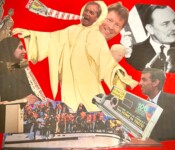Viewpoint – Europe: Christiania, Last Bastion of Free Thought
Forty years after a group of hippie squatters stormed and took over an ex-army base in Copenhagen for a permanent home, they now face the biggest challenge in their extraordinary history. The city’s new right wing government has asked the 1,000 members of the Christiania commune – the largest and longest living ‘squat’ in the world – to raise £18m in order to buy the part of the city they have run as unique self governing commune since the early 1970’s. While the members of Christiana admit they face a struggle to raise the money, success would ensure the future of the unique 85 acre site, which is visited by a million people every year, making it the biggest tourist attractions in Denmark after Legoland.
Synchronicity Magazine spoke to Britta Lillesoe, one of the founders and spokeswoman for Christiania’s ‘culture department’. She said Christiania was an integral part of Danish culture and promised it would always survive, in one form or other: “We are the social thermometer of Denmark, every voice and opinion is raised here. All are represented, we are the black sheep from all classes and if we can make it work so can the rest of society.”
The Danish government and police have clashed with Christiania’s residents on several occasions since 2008, when the government first decided to challenge the agreement its predecessors had drawn with the original squatters in 1972. The then Prime-Minister Ander Fogh Rasmussen said at the time: “It is unacceptable that a small spot in Copenhagen lives its own life, independently of the rest of society.”
Christiania started in 1965, when a group of squatters discovered an old run-down housing estate in Copenhagen and struck a deal with the landlord who said that they could live there for a nominal amount. As word spread, the size of the squat grew with the arrival of other hippies and squatters from all over Denmark. The commune tore down some of the older buildings and refurbished the rest, holding a huge party to celebrate their existence in 1966. The settlement, now named Sofiegaarden, lasted for five years, becoming a cultural hotspot.
It was located in the middle of an artistic neighbourhood where the most famous Danish artists from the period lived, practised or visited. Here Kim Larsen, the musical voice of the Danish working class, found his inspiration and formed the band Gasolin.
By 1971, the Danish housing shortage was at an all time high and squats such as Sofiegaarden had sprung up everywhere. A huge former military area, Christianshavn, close to the centre of the city, well developed but unused, stood empty. The future Christianites rallied the underground forces, stormed the gates with Molotov cocktails and set up camp. The military was called in but sympathised with the struggling youths, who were allowed to remain.
They called their new home Christiania, “Land of dreams” from a Norwegian hippie poem. Britta recalls: “We opened Christiania in 1971, Jacob Ludvigsen, another founder, wrote a letter of invitation to all who wanted to come and join. We had people from all over, classes and personalities didn’t matter. A lot of youths, lefties, bums, artists, social intelligentsia, rebels, 68ers, musicians. The first black people to come to Denmark went to us and brought Jazz with them.”
“Many Vietnamese fugitives sought refuge here but just as many youngsters from America who wanted to escape the draft joined the mix. Part of our collective travelled the world to find themselves and returned with hash from India.”
In 1972 Christiania grew too large in both size and influence for the Danish state to ignore. They labelled it a ‘social experiment’ and used it to home junkies, troubled young people and other social misfits, as an “alternative treatment camp”. In 1979 there were violent clashes and gang wars over drugs sales, with Hells Angels trying to take control. Soon the explosive mix of an open drug market and many unstable social elements escalated and Christiania was forced to round up the worst offenders and enforce harsh anti-hard-drug laws.
The problems continued to grow until 1992 when police forces raided Christiania, beginning a long period in which the commune became a conflict zone of drug wars, anarchist demonstrations and more police raids. In 2004 open hash dealing was outlawed throughout Denmark but persistent flouting of this in Christiania has led to regular police raids.
Throughout its turbulent life, Christiania has had its own democratic government and laws, only interacting with the Danish government by paying a symbolic amount in rent and utilities. Sociologists have supported Christiania as a vital expression of alternative culture and its existence a victory for modern democracy.
The current crisis began in 2008, when the government challenged the commune’s ownership of Christianshavn and in February this year, despite a long legal battle, the state won. They gave the squatters a chance to reclaim their homes, if they can raise £18m by early June.
With the anti-capitalist and down-to-earth lifestyle of Christiania’s residents, this seems unlikely and the story of this autonomous micro-nation might soon come to an end.
Despite the heavy attacks from the government over drug trade, anarchist demonstrations and the recent legal settlement Britta insists: “We will continue growing and glowing.”

























